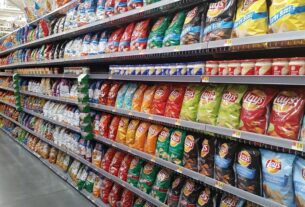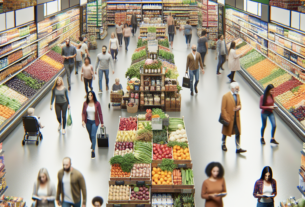How Grocery Retail Companies Are Investing in Mobile Shopping Apps
Introduction
The grocery retail industry has seen a significant shift towards digitalization in recent years, with more and more companies investing in mobile shopping apps to enhance the customer shopping experience. In this report, we will explore how grocery retail companies are leveraging mobile apps to drive sales, improve customer engagement, and stay ahead of the competition.
Current State of the Grocery Retail Industry
According to a report by CulinaryCoverage.com, the global grocery retail industry is expected to reach a value of $12 trillion by 2025. This growth is driven by changing consumer preferences, increased urbanization, and the rise of e-commerce. Traditional brick-and-mortar stores are facing stiff competition from online retailers, prompting grocery companies to innovate and adapt to the digital age.
Market Share and Key Players
The grocery retail market is highly fragmented, with a few key players dominating the industry. Companies like Walmart, Amazon, and Kroger have a significant market share and are leading the way in digital transformation. Walmart, for example, is investing heavily in its online grocery platform, while Amazon is expanding its grocery delivery services through its Prime Now app.
Financial Performance
Despite the challenges posed by e-commerce giants, traditional grocery retailers are holding their own in terms of financial performance. Companies like Kroger and Albertsons have reported steady revenue growth and are investing in technology to streamline operations and improve customer service. Kroger, for instance, reported a 10% increase in digital sales in the first quarter of 2025.
Benefits of Mobile Shopping Apps
Mobile shopping apps offer several benefits for both customers and retailers. For customers, these apps provide a convenient way to browse products, place orders, and track deliveries. For retailers, mobile apps can drive sales, improve customer loyalty, and gather valuable data on shopping habits and preferences.
Improved Customer Experience
One of the main benefits of mobile shopping apps is the enhanced customer experience they provide. With features like personalized recommendations, easy payment options, and real-time order tracking, customers can enjoy a seamless shopping experience from start to finish. Companies like Instacart and Shipt have seen a surge in app downloads due to their focus on customer satisfaction.
Increased Sales and Revenue
Mobile shopping apps have also been proven to drive sales and increase revenue for grocery retailers. By offering exclusive discounts, promotions, and loyalty programs through their apps, companies can incentivize customers to make more purchases and increase their average order value. This has been a successful strategy for companies like Target and Whole Foods, who have seen a boost in sales since launching their mobile apps.
Future Trends and Innovations
As technology continues to advance, grocery retailers are expected to embrace new trends and innovations to stay competitive in the market. Some of the key trends to watch out for in the coming years include augmented reality shopping experiences, voice-activated shopping assistants, and drone delivery services.
Augmented Reality Shopping
Augmented reality (AR) is poised to revolutionize the way customers shop for groceries. Companies like Tesco and Alibaba are experimenting with AR technology to create immersive shopping experiences that allow customers to visualize products in their own homes before making a purchase. This not only enhances the shopping experience but also reduces the likelihood of returns and exchanges.
Voice-Activated Shopping Assistants
Voice-activated shopping assistants, like Amazon’s Alexa and Google Home, are becoming increasingly popular among consumers. These devices allow customers to place orders, add items to their shopping lists, and track deliveries using just their voice commands. Retailers are integrating these assistants into their mobile apps to provide a hands-free shopping experience for customers on the go.
Conclusion
In conclusion, grocery retailers are making significant investments in mobile shopping apps to cater to the evolving needs of customers and stay competitive in the digital age. By offering personalized experiences, driving sales through promotions, and embracing new technologies, companies are redefining the grocery shopping experience for consumers worldwide. As the industry continues to grow and innovate, we can expect to see even more exciting developments in the future.



